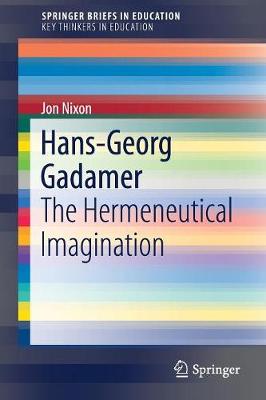SpringerBriefs in Education
2 total works
This book provides an introduction to Hans-Georg Gadamer’s thinking and shows how it might inform our own thinking about education as a lifelong process of engaging with one another and with the wider world. He insisted on the supreme importance of prior learning, but also on the unpredictability of human understanding and on the possibility of new and unforeseeable beginnings. Having lived through the catastrophe of two world wars, he became an important voice in the debate on the future of a reunified Germany and the role of the university in shaping the values and outlook of the new Europe.
His work is of immense significance for all those involved in the education of future generations.
'In Gadamer: The Hermeutical Imagination, Jon Nixon has pulled off quite a feat. In his customary lucid, accessible and dialogical style, we are treated to a masterly tour that both opens the complex thinking of Hans-Georg Gadamer and draws out its implications for our understanding of education. In the process, a strong critique emerges of contemporary instrumental approaches to education. Many will assuredly gain much from this enjoyable text, both those interested in Gadamer as such and those working in the philosophy of education.'
Ronald Barnett, Emeritus Professor of Higher Education, UCL Institute of Education, UK
‘This book simultaneously invites the reader to engage with the transformative potential of education and provokes the reader to imagine an educational landscape that values freedom, democracy and authenticity. Jon Nixon skilfully and eloquently draws the reader into the philosophies, life and legacy of Hans-Goerg Gadamer, a key thinker of the 20th century. Meticulously researched, this original study offers a biographical insight as well as critical commentary on Gadamer’s contribution to wider educational debates. An impressive contribution to the field.’
Tanya Fitzgerald, Professor of History of Education, La Trobe University, Australia
‘Gadamer: The Hermeneutical Imagination provides an excellent introduction to Gadamer's key ideas. Jon Nixon draws his readers into a conversation with Gadamer, inviting them to imagine the possibility of applying Gadamer's hermeneutical philosophy to their own educational practice. It is essential reading for all those who have an interest in – and commitment to – the future of education.’
Feng Su, Senior Lecturer in Education, Liverpool Hope University, UK
This book gathers some of Hannah Arendt’s core themes and focuses them on the question, ‘What is education for?’
For Arendt, as for Aristotle, education is the means whereby we achieve personal autonomy through the exercise of independent judgement, attain adulthood through the recognition of others as equal but different, gain a sense of citizenship through the assumption of our civic rights and responsibilities, and realize our full potential as sentient beings with the capacity for human ‘flourishing’ and ‘happiness’ (eudaimonia). In order to appreciate the pivotal role that education plays in Arendt’s analysis of the human condition, we have to understand the emphasis she placed on ‘thoughtfulness’, as the measure of our humanity and on ‘thoughtlessness’, as the measure of our inhumanity. Education sustains and develops the human capacity: to think together (phronesis), to think for oneself (what Arendt called ‘the two-in-one’ of thinking), and to think from the point of view of others (what she termed ‘representative thinking’).
From the developing constellation of ideas embedded in her vast and varied body of work, the author infers a notion of education as a necessary preparation for personal fulfillment, social engagement, and civic participation.

